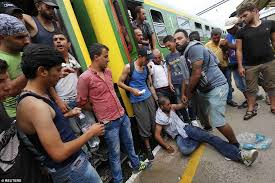 I have been meaning to comment on a ridiculous article in the National Post at the end of August, but one which does pertain, at least indirectly, to the current election. The article described the supposedly unassailable argument of Deputy Premier Deb Matthews against Patrick Brown on the subject of ‘women’s rights’ and abortion.
I have been meaning to comment on a ridiculous article in the National Post at the end of August, but one which does pertain, at least indirectly, to the current election. The article described the supposedly unassailable argument of Deputy Premier Deb Matthews against Patrick Brown on the subject of ‘women’s rights’ and abortion.
Here are the words of Ms. Matthews, for your own consideration:
“Ever since Patrick Brown rose from obscurity to take over Tim Hudak’s PC Party, I have been feeling uneasy,” Matthews wrote.
“As a woman, a mother and a grandmother, I am concerned about how far right Mr. Brown intends to take his party.
“Across Canada, women have fought and won the right to choose. Across Canada progressives fought for marriage equality. I thought those fights were over.
“But Patrick Brown sees things a different way.”
The apparently hot-for-Liberal author of this article, Kelly McParland, concluded breathlessly
As a political knifing, it doesn’t get much more skillful than that.
Pardon me? This rehashing of feminist platitudes passes for an ‘argument’, and an eminently ‘skillful one’ at that? I know they stopped teaching logic a long time ago, but perhaps Ms. Matthews is old enough to have benefited; if so, not much stuck. Or she is deliberately deluded. Or just complacent and assured of her sheep-like and docile audience.
The author of the article points to Ms. Matthew’s credentials as a mother and grandmother, but that just makes things worse.
Here is the rub: By her logic, Ms. Matthews is declaring that her children exist only at her whim; by another whim, and in another set of circumstances, she could have had them killed in the womb. The same goes for unborn children across this fair land, hanging by a fragile thread on the decision of their mothers for the first nine-months of their formation. For any reason whatsoever, declared or not, they may suffer capital punishment for the ‘crime’ of being a nuisance to their mothers, a situation that the minister and her colleagues, along with their federal counterparts under Trudeau, see as sacrosanct and beyond discussion. So much for the kindly nice-as-apple-pie-I’ve paid-my-dues-which the bachelor-Patrick-Brown-has-not grandmotherly Deb Matthews.
And marriage equality? Should we not at the very least be permitted to discuss in the open forum whether anal ‘sex’, what used to be termed ‘buggery’ ‘and ‘sodomy’, along with whatever it is that lesbians do, are legitimate bases for ‘marriage’? If so, what else might marriage be? Are these equivalent to conjugal, and life-giving, relations? Are we willing to jettison what every civilization has considered its foundation (i.e., natural marriage between a man and a woman) to please various self-confessed identity groups to fulfill their objectively disordered desires? Is this what Ms. Matthews actually thinks in her heart of hearts?
 One would hope that Patrick Brown has the acumen, or at least the willingness, to respond in kind, but I have not seen much evidence of either, especially with his attendance at the ‘Gay Pride’ parade. Does he really think this will appease them?
One would hope that Patrick Brown has the acumen, or at least the willingness, to respond in kind, but I have not seen much evidence of either, especially with his attendance at the ‘Gay Pride’ parade. Does he really think this will appease them?
Not one of the political parties wants to touch these shibboleths with a twenty foot pole (or is that poll)? Rather, they lie like fetid compost under the floorboards of our common house, but their stench is ever-present, and eventually the rot will become more and more difficult to hide.
There is a vast moral corruption and emptiness behind the pleasant facade of our modern civilization which, by the mercy of God, I hope is exposed soon to the full light of day. We already see part of this exposition in the migrant-refugee crisis engulfing Europe. I fear Steyn is correct, that the Muslim world, at least, has recognized our weakness and our own death spiral, and is arriving in daily-increasing droves (predominantly vigorous young men, according to U.N. reports) to fill the vacuum. As Father Rutler points out, paralleling my own post on this subject, a naive and emotional response to this crisis is, by definition, not the most prudent one, and may well lead to the destabilization of that ancient and venerable entity we call ‘Europe’. Does one really think that these Muslim men (with the minority women and children) are going to adopt ‘Western values’, to say nothing of Christian ones? Will Ms. Matthews, and her own disordered world-view, find a place in such a brave new world we are allowing to unfold?
Perhaps it will only be when the crisis ‘hits home’ for the well-protected, gated and privileged classes, likely in a way they may not expect, that they, and we all, will realize the full consequences not only of what we have done, but what we have aided and abetted by our political, and our personal, compromises with evil.




